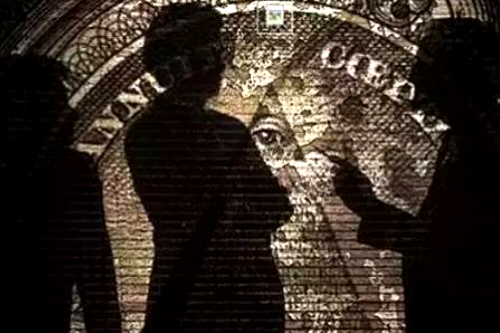Schumpeter: Control Freaks
熊彼特:控制狂
Lessons in the dark arts of corporate control from the tycoons of the new economy
新经济大亨们控制企业的“暗黑艺术”
This month Schumpeter visited the Barnes Foundation, a gallery in Philadelphia full of paintings by Picasso, Matisse and Van Gogh. Albert Barnes, born in 1872, is notable for two things. He made a fortune from an antiseptic that cured gonorrhoea. And he stipulated exactly how his art collection should be posthumously displayed. The result is hundreds of paintings jammed together nonsensically, often in poky rooms, and the creepy feeling of a tycoon controlling you from the grave.
本月,熊彼特专栏记者参观了费城的巴恩斯基金会。这是一家画廊,收藏了大量毕加索、马蒂斯和梵高的画作。阿尔伯特·巴恩斯出生于1872年,他有两件事值得了解。一是靠一种能治愈淋病的杀菌剂发了笔大财,二是明确规定了自己死后自己的艺术藏品该如何被展示。结果就是成百上千幅画作毫无章法地挤在一起——通常都是在狭小的房间里,并且有一种让人毛骨悚然的感觉——一个大亨从坟墓里控制着一切。
Barnes’s string-pulling comes to mind when considering today’s prominent tycoons, who often hail from technology, e-commerce and media. At the moment they seem omnipotent. But many founders are gradually cashing in shares in their companies. The consequences will vary by firm, with some tycoons gradually ceding control, and others clinging on to it.
说到今天那些来自科技、电子商务和媒体行业呼风唤雨的大亨们,就会想起巴恩斯那紧拽着木偶扯线的形象。目前他们看起来无所不能,不过许多创始人正在逐步将自己在公司的股票套现,结果将因公司而异:有些大亨会逐渐放弃对公司的控制权,另一些会抓住不放。
A flurry of selling activity has been in evidence of late. On September 13th Jack Ma and Joe Tsai, co-founders of Alibaba, a Chinese e-commerce behemoth, said they planned to sell up to $4bn of stock by the end of 2018. Nine days later Mark Zuckerberg said he would dispose of Facebook shares worth up to $13bn by early 2019. Jeff Bezos has cashed in $2bn of Amazon stock this year. Pony Ma, the boss of Tencent, a Chinese digital giant – and no relation to Jack – intends to sell $5bn of its stock (although the timetable is unknown). The transactions add up to a tenth of the total value of these founders’ holdings in their companies.
最近,一些公司创始人接连出售股权,引人注目。9月13日,中国电子商务巨头阿里巴巴的联合创始人马云和蔡崇信表示,他们计划在2018年底前出售40亿美元的股票。9天后,马克·扎克伯格表示,到2019年初他将卖掉价值130亿美元的Facebook股票。今年,杰夫·贝索斯已将20亿美元的亚马逊股票套现。中国数字巨擘腾讯的老板马化腾(非马云亲戚)打算卖出50亿美元的公司股票(尽管时间表未知)。这些交易额的总和相当于这些创始人在公司中所持股份总价值的十分之一。
More sales can be expected. Mr Tsai has just spent $1bn buying 49% of the Brooklyn Nets, a basketball team. Mr Bezos needs $1bn a year for a space-rocket project, and Mr Zuckerberg and Pony Ma harbour philanthropic ambitions. None of the firms pay substantial dividends. They also pay their staff in stock, diluting existing owners (and thus reinforcing the effect of founders’ share sales).
预计未来还会有更多的套现行为。蔡崇信刚刚斥资10亿美元收购了布鲁克林篮网队(Brooklyn Nets)49%的股份;贝索斯每年需要10亿美元投入太空火箭项目;扎克伯格和马化腾都立志发展慈善事业。这些公司中没有一家有可观的分红。它们还向员工发放股票,摊薄了现有股东的股权(从而也增强了创始人出售股份这一举动的影响)。
To see the effect of stock disposals and dilution, consider eight founder-run firms: Alibaba, Alphabet, Amazon, Facebook, Netflix, Tencent, Tesla and SoftBank. The median economic stake of their founders is 13%. On the current trajectory that will fall to 8% in half a decade; the tech tycoons might cash out even faster.
要了解股权出售和摊薄的影响,我们来看八家由创始人经营的公司:阿里巴巴、Alphabet、亚马逊、Facebook、Netflix、腾讯、特斯拉和软银。其创始人持股的中位比例为13%。按照目前的趋势,这一比例将在五年内降至8%——科技大亨们可能会以更快的速度套现。

Each firm has its own structure, reflecting how ruthless its founder was early on and how much share capital it has raised, among other things. But there are two main kinds of company: those run by control freaks, and those run by control fanatics.
每家公司都有自己的股权结构,可反映出公司创建之初其创始人集权的程度、后来筹集到多少股本等等。不过这几家公司大体分为两类:由“控制怪人”经营的公司,以及由“控制狂人”经营的公司。
At control-freak firms, economic and voting power is aligned. As the founders sell, their legal powers decline, too. Reed Hastings at Netflix is furthest down this path. He has cut his stake from 7% in 2007 to 3% but dominates Netflix by sheer force of personality. That is impressive but he is more vulnerable as a result.
在由控制怪人掌管的公司中,持股比例和投票权相对应。创始人出售股权后,其法定权力也相应减弱。Netflix的里德·黑斯廷斯(Reed Hastings)在出售股权这条道路上走得最远。他已将自己的持股比例从2007年的7%降至3%,但仍凭借纯粹的人格力量掌控着Netflix。这一点令人赞叹,但他的地位也因此更不稳固。
Amazon is also heading in this direction. Mr Bezos’s economic and voting stake has fallen from 25% in 2007 to 16%. At the present pace the top three institutional investors will, together, be able to outvote him by late 2018. Elon Musk owns 20% of Tesla’s economic and voting rights, but his stake will probably fall, too. His personal finances appear stretched – he has taken out loans secured against some of his shares. And Tesla needs to issue more equity to fund its ambitious plans, which will dilute him. Such leaders are lionised and it is hard to imagine their firms without them, as once it was difficult to imagine Microsoft without Bill Gates. But over a decade they could shift to institutional ownership. Apple and Microsoft have already made the leap.
亚马逊也在朝着这个方向发展。贝索斯的持股比例和投票权从2007年的25%下降到16%。按照目前的速度,三大机构投资者的投票权加在一起将在2018年底超过贝索斯。埃隆·马斯克在特斯拉的持股比例和投票权比例为20%,但也可能会减少。他已用部分股份抵押贷款,个人财务状况似乎较为紧张。特斯拉需要发行更多的股票为其雄心勃勃的计划融资,这又将摊薄马斯克的股权。这些领导人受到热捧,很难想象公司没有他们会怎样,就像曾经很难想象没有比尔·盖茨的微软会如何。但十年后,这些公司可能都会转为机构持股。苹果和微软已朝此方向迈出了一大步。
The destiny of firms run by control fanatics, the second category, is murkier. Their founders use dual classes of shares or other mechanisms to keep voting rights even as they lower their economic exposure. Alphabet has three share classes; Larry Page and Sergey Brin have an 11% economic stake but 51% of voting rights. If they sell slugs of stock, as they have done in the past, they could cut their economic stake to as low as 6% while keeping majority control. Facebook’s two share classes allow Mark Zuckerberg to have 51% of the votes with 14% of its economic rights. This year he considered a scheme to concentrate power in his hands still more, but abandoned it in September after shareholders sued.
第二类由控制狂人掌管的公司命运就更捉摸不定了。这些公司的创始人采用双重股权结构或其他机制,让自己在减持股份的同时仍能保持多数投票权。Alphabet有三类股权,拉里·佩奇(Larry Page)和谢尔盖·布林(Sergey Brin)共持股11%,但拥有51%的投票权。如果他们像过去那样继续减持股票,那么持股比例可能降至6%,但仍能保留多数控制权。Facebook的两种股权让马克·扎克伯格以14%的持股比例拥有51%的投票权。今年他曾考虑将权力更多地集中在手中,但在股东提起诉讼后于9月放弃了这一计划。
Asia’s control fanatics use different levers. Masayoshi Son owns only 21% of SoftBank’s economic and voting rights. But he has set up an associated $100bn investment vehicle, the “Vision Fund”, over which he seems to have near-total control. Pony Ma owns 9% of Tencent’s economic and voting rights, down from 13% in 2007. Naspers, a South African media firm, has a stake over three times bigger but has less influence. That is partly because Pony Ma has majority stakes in Tencent’s two key subsidiaries in mainland China, which he has agreed to allow Tencent to run.
亚洲控制狂人们的集权手段有所不同。孙正义仅拥有软银21%的股票和投票权,但他建立了一个价值1000亿美元的联合投资工具——“愿景基金”(Vision Fund),并似乎拥有该基金将近百分之百的控制权。马化腾在2007年拥有腾讯13%的股权和投票权,现在降至9%。南非一家传媒集团Naspers的创始人在腾讯的持股是马化腾的三倍多,但控制权却更小。这在一定程度上是因为马化腾在腾讯中国的两家关键子公司拥有多数股权,他同意这两家子公司由腾讯运营。
Alibaba has the most accomplished fanatics. Jack Ma and Mr Tsai have designed a triple-lock system. A pact obliges other strategic shareholders to vote with them. A majority of board seats must be appointed by the “Alibaba Partnership”, a club of senior staff whose permanent members are Jack Ma and Mr Tsai. Jack Ma has a majority holding in several key subsidiaries in China, which Alibaba operates. Alibaba’s construct resembles the legal equivalent of a surrealist painting (the government is probably the only body that could possibly wrest away control).
阿里巴巴拥有最高超的控制狂人。马云和蔡崇信设计了一个三重保障机制。两人与其他战略股东达成协议,要求他们投票时与自己保持一致。董事会的多数席位必须由“阿里巴巴合伙人”任命,合伙人由公司持股高层担任,其中马云和蔡崇信是永久合伙人。马云在中国几家由阿里巴巴运营的关键子公司中拥有多数股权。阿里巴巴的架构就像一幅法律版的超现实主义画作(也许只有政府能够夺走对它的控制权)。
下载:英文、中文版本








